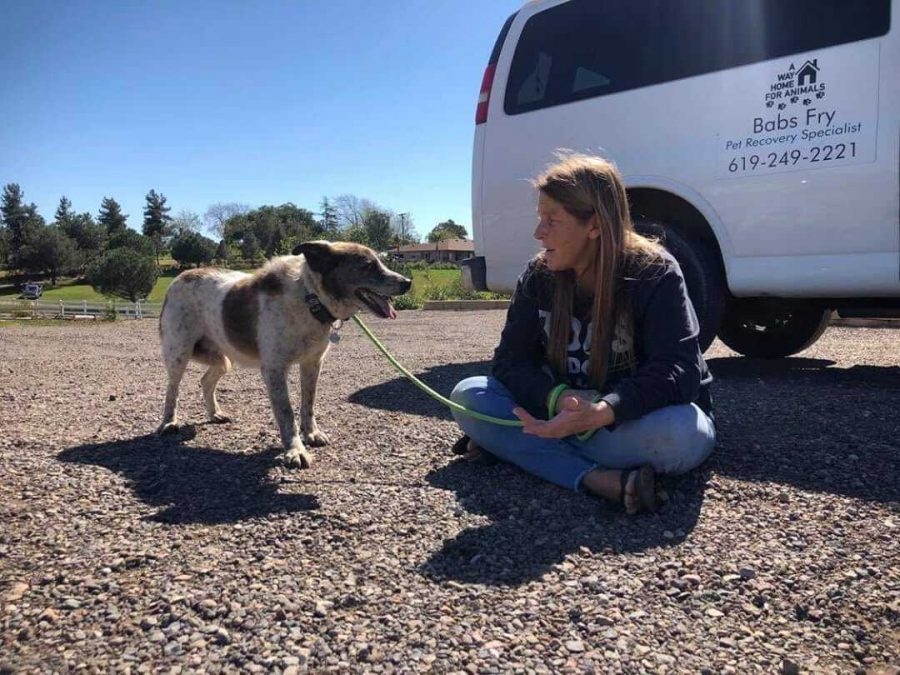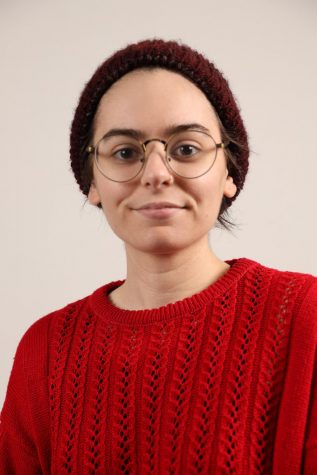When “Valley Fire” ripped through Jamul, an unincorporated region of eastern San Diego county, in Sept. 2020, Babs Fry said she made a quick call to her loved ones to confirm that she was sticking to her plan – and that she loved them. Fry would not evacuate. Her loved ones were disappointed, maybe, she said – but not surprised.
She stayed and looked after her own animals, of which she has close to 100 on her property, and assisted in the recovery and care of pets and livestock that belonged to many surrounding properties despite the wildfire being only five miles from her home. She even helped evacuate some animals as rescue organizations were no longer permitted to enter the evacuation zone.
“When it came down to make that decision, it wasn’t a difficult one for me. It was a tearful one,” Fry said. “But leaving my animals behind to fend for themselves, or hope somebody else got them out was never an option for me.”
Babs describes her day-to-day life as “triage.” She is an animal recovery specialist and known by animal-lovers across Southern California as the singular person to call if your pet is lost. If you happen to catch her on the phone, she is usually on the fly. She is a quick talker, straight shooter, and problem solver with a small-town air about her.
Those who have volunteered with Fry in the field say she has an unbreakable focus and describe her as “intense.” When volunteers are helping in the field, they are supposed to be quiet for the most part. They say she is bossy – but not in a bad way. They know it is life-or-death for the animals, and Fry knows what needs to be done.
One of Fry’s volunteers laughed as she recalled her after a long day at work exclaiming “I didn’t yell at anyone!” It’s only in brief moments such as this – or when Fry gets stuck in her own trap – that the team has time to laugh with her.
Sylvia Lopez has known Fry for three years and volunteers with her in the field. She said there is no way to know what she is thinking while she works. Lopez said she attempts to anticipate Fry’s next move – but to no avail.
“I don’t know what her secret is. She has a secret power … She puts herself in the dog’s place and just thinks, ‘What’s my next step if I were the dog?’ Lopez said.
She has a secret power … She puts herself in the dog’s place and just thinks, ‘What’s my next step if I were the dog?’
— Sylvia Lopez
“There’s been times where she’ll say, ‘Okay, we’re going to set up a trap here,’” Lopez said. “And I’m thinking to myself, ‘Really? Are you sure this dog is going to come here?’ And next thing you know, we get a call and the dog is in the trap. So I honestly don’t know what or how she does it. I don’t have the answer.”
Lopez said that Fry always has a plan B, C, D, etc. Fry said it is like a recipe, and it’s also the reason she requests to be directly involved in the recovery of lost pets.
“It’s not a textbook, black-and-white sort of scenario. Every dog is different. Every owner is different. Every set of circumstances is different,” she said. “There are so many variables that, combined incorrectly, can be disastrous. There are occasions where you omit certain pieces, or you add in things you wouldn’t do elsewhere, or that you do in a different order … That’s why I beg people to please just call me, because my experience is what we need to bring to the table at that point to set you and your dog up for success.”
Mike Colafrancesco, a San Diego firefighter, and his wife Mandy, an ER nurse, were reunited with their lost dog thanks to Fry’s experience. After months of non stop stressful work conditions, the Colafrancesco family boarded a plane for small family get-away. They left their dogs with a boarding facility they had used a number of times before. As they were boarding the plane, they learned their youngest dog had escaped. Mandy called Penny a “COVID puppy.” Penny was four months old when shelter-in-place orders first took effect.

“You’re supposed to start socializing [puppies at four months], but it was March. So everybody was on lockdown. We weren’t taking her anywhere, and kids were home every day, so she didn’t get that exposure,” Mandy said. “She has a lot of separation anxiety from us. When she had a chance, she took that – she ran.”
Mandy said the boarding facility did everything it could and should have, and immediately informed them and Fry, known by animal handlers in Southern California for her expertise. She started delegating orders to the boarding facility and to the Colafrancesco family from afar. Fry said every action the owner takes has an effect on what the dog does.
“If we’re acting based on assumptions that are human-based, not factually, based on what a dog does, we’re setting things back,” she said.
One of the worst things an owner can do for a lost pet is to run around searching and hollering for it, according to Fry. A dog’s sense of smell is so sensitive that it will confuse a lost animal who is trying to find you. It can cause the lost pet to wander in circles, rather than having a scent trail to follow home. Not only that, but even a fearful dog – especially a fearful dog – will run from its owner once it is lost outside. Fight or flight instincts overcome the animal. Before the animal can process who is running after them, all they know is that they are being chased by something – so they run and hide. Fry said these human interventions (or lack thereof) make all the difference in whether an animal will find their way home or be rescuable.
“When you tell people, ‘Don’t look for your dog,’ they think you’re crazy,” she said.
Fry spends a lot of time educating anxious owners, the Colafrancescos included, about animal behavior. Dogs and humans are different species, and you must think like the dog to find them, she teaches. Despite thinking of Penny as an anxious puppy, Fry encouraged Mandy to trust in Penny’s instincts. She was stern and confident, they said, which quickly gained their trust.
“I give them explanations, the reasoning behind the method that correlates to the dog behavior. And that gains credibility from them with me, and it makes sense,” Fry said. “But it doesn’t make it easy. It’s still super hard not to go look for your dog. Lots of people are resistant to the process. And not only that, but the challenge isn’t just the initial resistance. Frequently, it takes time, especially with the super fearful dogs to get them safe.”
Fry coaches pet owners every day to “trust the process” as they grapple with uncertainty and a feeling of powerlessness. She learned what that meant herself through recovery, she now has “13 years clean and sober.” While those around Fry may not always understand her drive, persistence and lengths she goes to for animals – she is always grounded in what the work means to her. This gift, she says, is God’s way of reminding her that something beyond herself controls the outcome. She said in that way her work “is self-care” because it keeps her focused on “something besides other things that might not be pleasant.”
She said she was a true alcoholic – grateful she never dabbled in too many drugs. She tried weed once, but it didn’t do much for her. When her alcoholism brought her to what she thought was the breaking point of losing her husband — along with everything else in her life — she quit alcohol. Denouncing alcohol didn’t solve her problem though, she said. She quit for everyone else, not herself, and developed a new relationship to addiction when she was prescribed Adderall.
I basically had a psychiatrist giving me enough Adderall and meth to sustain a 350-pound-man per day.
— Babs Fry
“I basically had a psychiatrist giving me enough Adderall and meth to sustain a 350-pound-man per day,” Fry said. “Speed, in a year and a half, jacked up more in my life than alcohol ever did. But it took me to the bottom, I needed to really realize that I had an issue and a disease that was beyond just the addiction. It was about, self-love and awareness that something beyond myself controls the outcomes.”
Inadvertently, she says, she talks a lot of “program” to people when it comes to their pets.
“At the end of the day, it really is all about believing that something beyond yourself controls the outcomes and trusting the process,” she said.
This was not always easy for Fry. She said it was hard to accept the idea of a higher power at first while in recovery. When it finally clicked, the spiritual connection she discovered became integral to the work she does.
“I really struggled for a long time with a connection to God … it was through recovery and a lot of work – that I realized animals truly are my spiritual connection.”
Fry depends on animal nature, a factor entirely out of her control, to help her track and rescue lost animals. The tools she learned “revolutionized” her life – including the realization that her world had been driven by fear – another factor that drives her work.
“Fear of failure, fear of being alone, fear of success or fear of everything. One thing that really drives me when it comes to these dogs is thinking about them out there – they’re afraid and alone,” Fry said.
Twenty-eight days passed before a sighting of Penny, who was spotted on San Pasqual Reservation land in Valley Center. They were fortunate to have support from tribal leadership and authorities who gave Fry access to certain areas to track Penny and allowed Mandy to join the Valley Center Facebook page to share Penny’s poster and information. With guidance from tribal authorities, Fry set cameras where she was permitted to. With the help of the cameras, she caught Penny crossing through the frame two days in a row. Mandy said Fry was “super confident” that she understood Penny’s daily routine.
Fry told Mandy that she would drive to Valley Center at noon to set the trap. Mandy said she sent her video of Penny and said “she walks through there at four o’clock. You guys need to be available to come up here.”
“No kidding. I think it was 4:18 or 4:20 and Penny walks through the camera, then just a few minutes later, she’s in the trap,” Mandy said. “She knew her routine. She knew where she was going.”
The drive up to reunite with Penny was emotional, but Fry had told them to stay calm as to not overwhelm Penny. Thirty-four days after her escape, nervous “COVID-puppy” Penny was reunited with her family. Mandy said Mike is over-the-moon and proud of Penny for surviving her ordeal. Penny, who was only a year old and had only known life in quarantine, had learned to travel the water system and keep herself alive for a month.
“Everybody presumes that eventually they all die because they’re going to starve to death. They’re going to die of dehydration, or they’re going to die from the elements,” Fry said. “And I’m here to tell you that very rarely do any of those things kill them. … And that doesn’t mean they won’t get sick… I’ve had dogs with broken jaw survived for months out there. Literally. The dog got pretty emaciated. But it had survival instincts which said it was going to eat at least enough to not die. It’s all instinct, they won’t die of dehydration.”
Fry said that the Colafrancescos are an example of a family who does all the right things. But that isn’t always the case.
Getting owners on board is hard enough in the beginning. Fry’s recommendations to owners, which are not one-size fits all and specific to each case, can include putting dirty underwear in trees to lure the animal, opening the doors and windows to waft the owner’s scent, and most importantly – not running around looking for the dog. Fry said it’s even more difficult to keep owners on board with the rules once someone has sighted their animal.
The Colafrancescos and their respective communities wanted to thank Fry for Penny’s safe return – but she doesn’t accept money for her services for three reasons: First, she said she is not a “good receiver;” Second, she wants the public to trust her, and she worries money could dilute how the public could see her motives; Third, she wants her services to be accessible to everyone regardless of income.
Fry is not independently wealthy though and her mission to save animals has become her more of a full-time career than her career in real estate. She fields calls every day and into the nights and said she has probably spent $100,000 in a year alone.
When Bab’s turned down their financial offer, the Colafrancescos looked to see if she had a charity and noticed that she had one, but it was no longer registered. Mike, who runs two nonprofits, has a “tax-guy” and a “web-guy,” and is going to help get Fry’s charity reinstated and looked after yearly and as an ongoing financially sustainable gift.
“She slept in her van overnight for a Penny and for us several nights out there in Valley Center. She drove so far, because she doesn’t live in Valley Center,” Mandy said. “We wanted to donate to her to help her because of what she does, she has a talent.”









